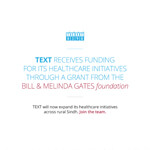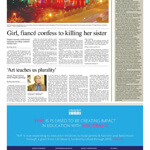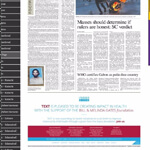TEXT WEBSITE TERMS & CONDITIONS
("AGREEMENT")
Please read these Terms & Conditions ("Agreement", "Terms & Conditions") carefully before using www.text.com.pk ("the Site"). This Agreement sets forth the legally binding terms & conditions for your use of the Site at www.text.com.pk. By accessing or using the Site in any manner, including, but not limited to, visiting or browsing the Site or contributing content or other materials to the Site, you agree to be bound by these Terms & Conditions. Capitalized terms are defined in this Agreement.
This Agreement was last modified on September 3, 2014.
Intellectual Property
The Site & its original content, features & functionality are owned by TEXT & are protected by copyright, trademark, patent, trade secret & other intellectual property or proprietary rights laws & treaties.
Termination
We may terminate your access to the Site, without cause or notice, which may result in the forfeiture & destruction of all information associated with you. All provisions of this Agreement that by their nature should survive termination shall survive termination, including, without limitation, ownership provisions, warranty disclaimers, indemnity & limitations of liability.
Links To Other Sites
Our Site may contain links to third-party sites that are not owned or controlled by TEXT. TEXT has no control over & assumes no responsibility for, the content, privacy policies, or practices of any third party sites or services. We advise you to read the terms & conditions & privacy policy of any third-party site that you visit.
Governing Law
This Agreement (and any further rules, polices, or guidelines incorporated by reference) shall be governed & construed in accordance with the laws of Karachi, Pakistan, without giving effect to any principles of conflicts of law.
TEXT WEBSITE PRIVACY POLICY
This Privacy Policy was last modified on September 3, 2014.
This page informs you of our policies regarding the collection, use & disclosure of Personal Information we receive from users of the Site.
We use your Personal Information only for providing & improving the Site. By using the Site, you agree to the collection & use of information in accordance with this policy. Unless otherwise defined in this Privacy Policy, terms used in this Privacy Policy have the same meanings as in our Terms & Conditions, accessible at www.text.com.pk.
Information Collection & Use
While using our Site, we may ask you to provide us with certain personally identifiable information that can be used to contact or identify you. Personally identifiable information may include, but is not limited to, your name, email address, postal address & phone number ("Personal Information").
Log Data
Like many site operators, we collect information that your browser sends whenever you visit our Site ("Log Data"). This Log Data may include information such as your computer's Internet Protocol ("IP") address, browser type, browser version, the pages of our Site that you visit, the time & date of your visit, the time spent on those pages & other statistics.
Cookies
Cookies are files with small amount of data, which may include an anonymous unique identifier. Cookies are sent to your browser from a web site & stored on your computer's hard drive.
Like many sites, we use "cookies" to collect information. You can instruct your browser to refuse all cookies or to indicate when a cookie is being sent. However, if you do not accept cookies, you may not be able to use some portions of our Site.
Security
The security of your Personal Information is important to us, but remember that no method of transmission over the Internet, or method of electronic storage, is 100% secure. While we strive to use commercially acceptable means to protect your Personal Information, we cannot guarantee its absolute security.
Changes To This Agreement
We reserve the right, at our sole discretion, to modify or replace these Terms & Conditions by posting the updated terms on the Site. Your continued use of the Site after any such changes constitutes your acceptance of the new Terms & Conditions.
Please review this Agreement periodically for changes. If you do not agree to any of this Agreement or any changes to this Agreement, do not use, access or continue to access the Site or discontinue any use of the Site immediately.
Contact Us
If you have any questions about this Agreement, please contact us at talk@text.com.pk.
 TEXT IS PLEASED TO BE CREATING IMPACT in health with the SUPPORT of THE
TEXT IS PLEASED TO BE CREATING IMPACT in health with the SUPPORT of THE 











